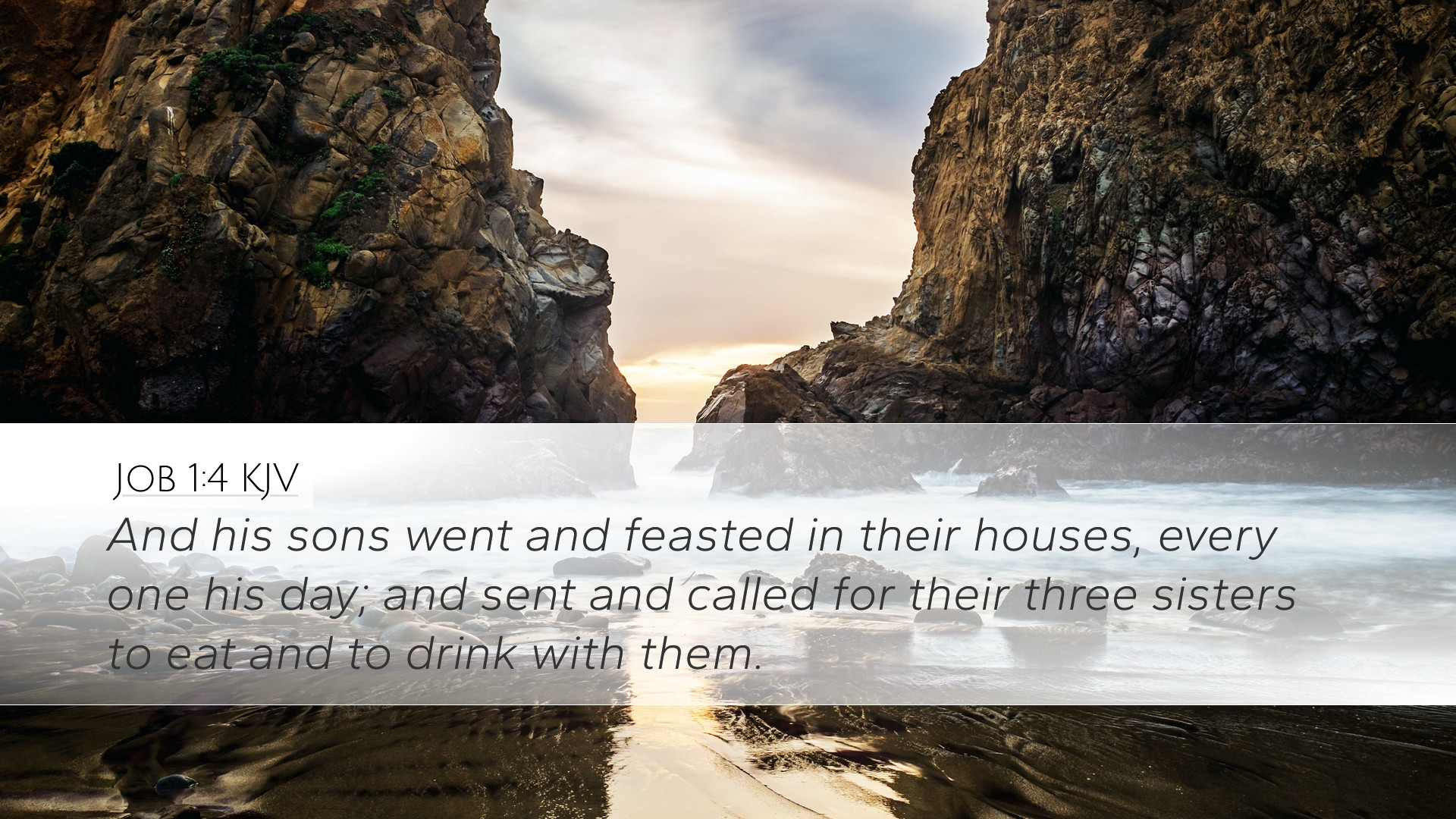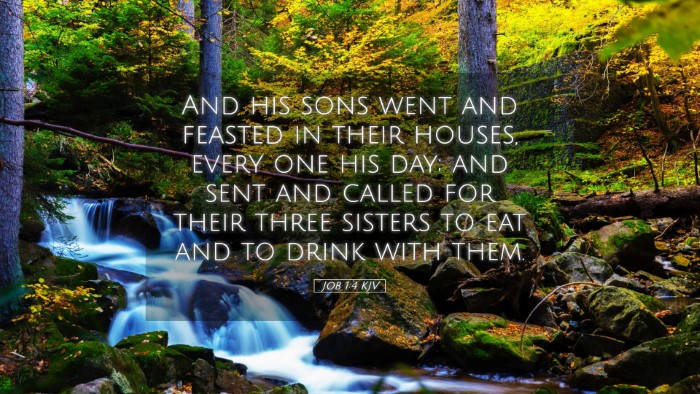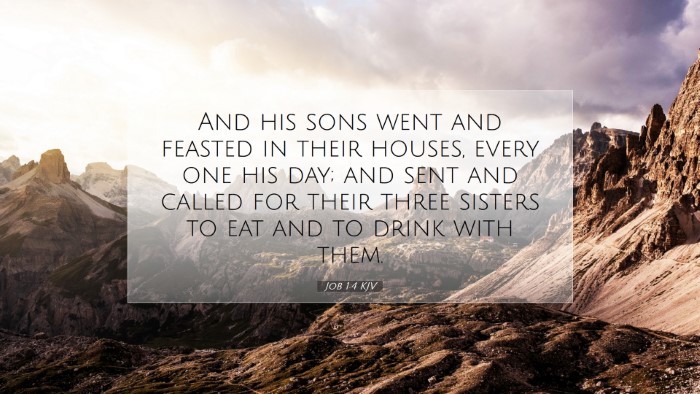Old Testament
Genesis Exodus Leviticus Numbers Deuteronomy Joshua Judges Ruth 1 Samuel 2 Samuel 1 Kings 2 Kings 1 Chronicles 2 Chronicles Ezra Nehemiah Esther Job Psalms Proverbs Ecclesiastes Song of Solomon Isaiah Jeremiah Lamentations Ezekiel Daniel Hosea Joel Amos Obadiah Jonah Micah Nahum Habakkuk Zephaniah Haggai Zechariah MalachiJob 1:4
Job 1:4 KJV
And his sons went and feasted in their houses, every one his day; and sent and called for their three sisters to eat and to drink with them.
Job 1:4 Bible Commentary
Commentary on Job 1:4
The verse Job 1:4 states: "And his sons went and feasted in their houses, every one his day; and sent and called for their three sisters to eat and to drink with them."
This verse serves as an introduction to the moral and spiritual landscape surrounding Job and his family. It highlights the nature of Job's children and the family's social and perhaps festal life. In this commentary, insights from various public domain sources provide a deeper understanding of the text.
Insights from Matthew Henry
Matthew Henry elaborates on this verse by noting the regularity and harmony within Job's family. He points out that the term "his day" refers to the days of feasting which were likely on occasions of birth or other family events. This suggests a structured familial relationship characterized by unity and shared joy.
Henry emphasizes that social gatherings can serve as an opportunity for creating bonds. He offers a cautionary note that while feasting itself is not wrong, it should not detract from one's relationship with God. The children’s decision to invite their sisters reflects a sense of community, which aligns with the high value of family in biblical times.
Albert Barnes' Commentary
Albert Barnes gives attention to the distinguished character of the gatherings. He observes that these feasts appear to be frequent, highlighting their wealth and prominence. Barnes mentions that such regular festivities can signify stability and prosperity, yet they could also be seen as opportunities for temptation, indulgence, and potential moral decline.
Additionally, Barnes indicates that the mention of the sisters specifically being invited lends a sense of decorum and inclusion. He argues that Job's children displayed not only camaraderie but also respect for one another, engaging in practices that reflect love and concern for familial ties.
Reflections from Adam Clarke
Adam Clarke’s commentary focuses on the significance of feasting in the narrative. He interprets the feasts as manifestations of joy and celebration, likely in the context of family unity and shared experiences. Clarke also remarks on the spiritual condition of the children; while they enjoyed feasting, it raises questions about their relationship with God. The indulgence in merriment should be balanced with reverence towards the Almighty.
Clarke concludes that, in observing these feasts, it may be inferred that while blessed with abundance, Job’s children should remain dedicated to holiness and gratitude. Clarke’s observations encourage a self-examination of one’s motivations in revelry and the need for discernment in joyful celebrations.
Theological Implications
The verse serves to set the stage for the dramatic events that follow in Job’s life. Job 1:4 subtly introduces themes of family, wealth, and spiritual attentiveness. The joyful occasions of feasting can be juxtaposed with the trials Job faces, leading to deeper theological reflections on prosperity and suffering.
Theologically, this introduces the broader discourse on the nature of blessings. It is vital for believers to recognize that prosperity comes with responsibility. The feasting initiated by Job’s sons serves as an allegory for the human condition – the propensity to celebrate life's joys while neglecting the awareness of a divine presence.
Practical Applications
- Family Unity: The importance of family gatherings in fostering close relationships is underscored. Regular fellowship among family can cultivate love and support against life's challenges.
- Mindful Celebrations: When engaging in celebrations, one should maintain a focus on spiritual health and integrity. Acknowledging God’s blessings should accompany any earthly festivities.
- Awareness of Temptation: Awareness of the potential pitfalls in indulgence is crucial. Believers are encouraged to remain vigilant to ensure that social practices align with godly living.
- Reflection on Integrity: The integrity of the individual should shine through in communal gatherings. Job's character may have set a standard for his children, reflecting the importance of role modeling in family dynamics.
Conclusion
Job 1:4 serves as an excellent lens through which to view biblical family life and provides rich content for both reflection and application. Through the commentaries of Henry, Barnes, and Clarke, it becomes evident that the spiritual precedents set within family structures influence not just individual faith but communal well-being. In essence, this passage invites deeper thought on how the feasts of today can still reflect a heart attuned to recognizing God's presence in all celebrations.


